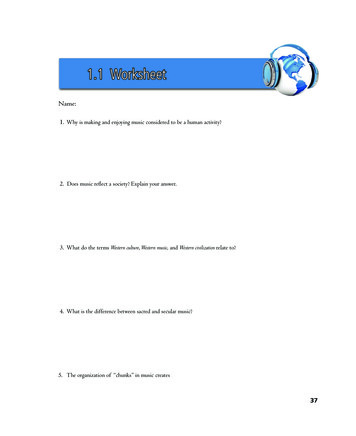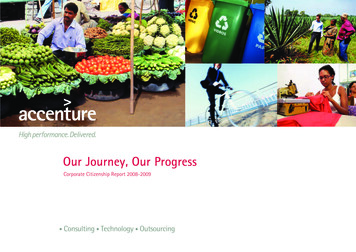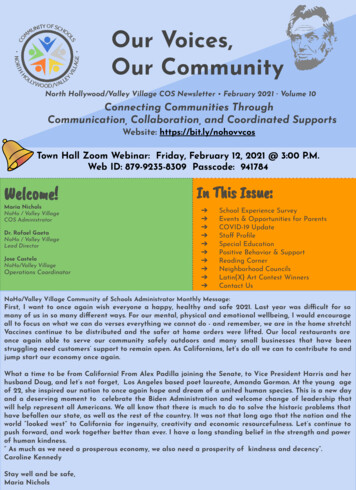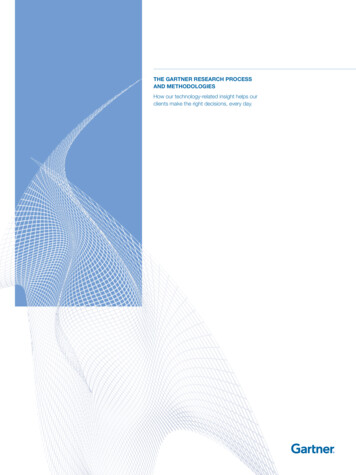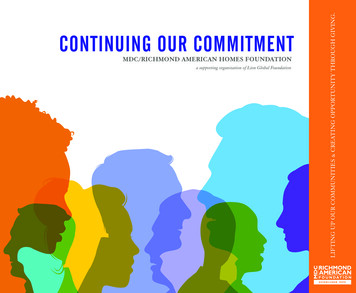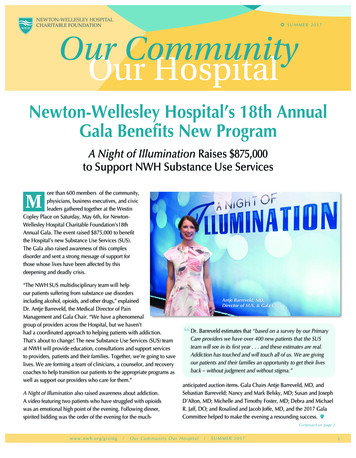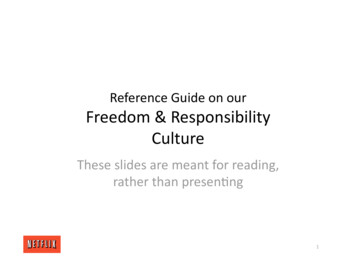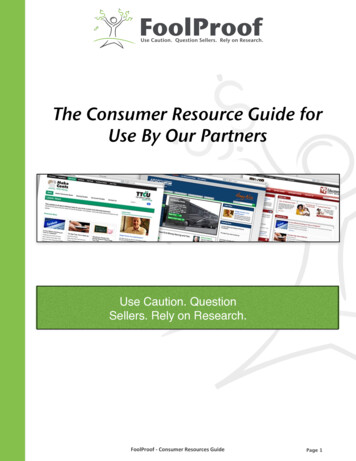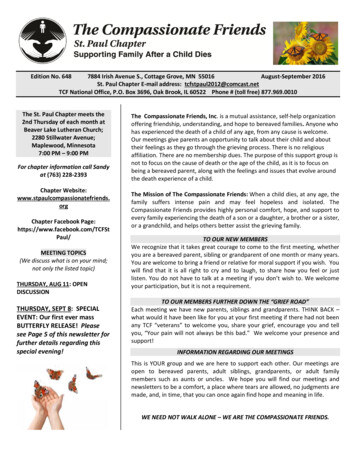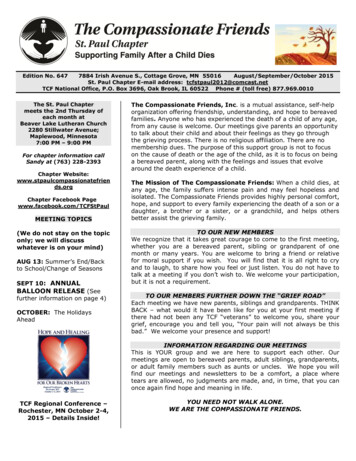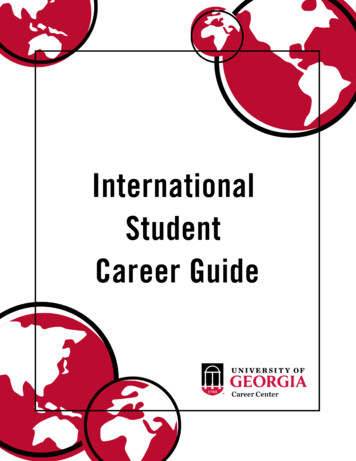
Transcription
Table of ContentsA Quick Guide to our Services3CPT/OPT/AT4-5H1-B Visas6Career Readiness Skills7-8Online Resources9Resumes & CVs10-13Researching Employers14Networking15Informational Interviews16Top Interview Tips17Dress for Success18U.S. Workplace Etiquette19Additional Departments202
A Quick Guide to Our ServicesThe Career Center provides a variety of services to UGA students and alumni, including:Arch Ready Professionalism Certificate — This program includes a series of workshopsdesigned to help you prepare for professional life after graduation. Students who complete theprogram will receive a printed certificate and a lapel pin. Learn more at career.uga.edu/archready.Individual Career Counseling — Career Consultants are available to meet individually withstudents at any point during their time here at UGA. To schedule an appointment, call 706-5423375 or log in to your Handshake account.Drop-In Hours — Have a quick question? Stop by the Career Center Multipurpose Room from 11a.m. - 2 p.m., Monday-Friday during fall and spring semesters, to meet with a Career Center teammember for 10 minutes. No appointment necessary. Career Consultants also hold drop-in hours invarious locations around campus. Check out career.uga.edu and click on “Contact” to find yourconsultant.Career Assessments — Learn how your personality, interests, values, and skills can help youchoose a major and career. See career.uga.edu/majors careers/assessments to take a careerassessment.Mock Interviews — Schedule a mock interview to practice with your Career Consultant to makesure you are ready to talk with employers or admissions committees.Career-Related Programming — The Career Center facilitates programs throughout the year.For a list of events, visit: career.uga.edu/calendar.Intern for a Day — Need experience? Check out the Career Center’s job shadowing program:career.uga.edu/job search/internships/intern for a day.Online Resources — Under the “Resources” tab at career.uga.edu, check out the “Career Guides”link and “Online Resources” link for additional tools including theGraduate Student Guide, Big Interview, Glassdoor, the Vault,Interstride, and more!Handshake — This platform is your online job and internshipboard. Begin here when looking for internships and jobs that arefor UGA students and alumni. Handshake includes part-time, fulltime, and on/off-campus employment. International Students cansearch by Work Authorization type.3
CPT/OPTCPT (Curricular PracticalTraining)OPT (Optional Practical Training)F-1 Visa StatusF-1 Visa StatusCPT can only be authorized durWhen can I ing your academic program.CPT cannot be authorized afteruse CPTand OPT? the end of your academic program.Do I haveto have ajob offer?OPT is usually used after the completion of your program. (Precompletion OPT is authorized priorto completion).Yes, with CPT, approval is givenNo, you do not need a job before apfor a specific employer during aplying for OPT.specific time.Can I work No, with CPT, the job must beat any kind considered an integral part ofyour academic program.of job?No, with OPT, it is your responsibility to find employment in your fieldof study.Who gives Immigration Services can givethe author- CPT authorization. Processingtime is approximately 2 weeks.ization?Immigration Services can only recommend OPT, you must apply withUSCIS for authorization. Processingtime is up to 90 days.There is no limit to the amountof CPT you can use. If you usefull-time CPT for more than 12months/365 days, you will loseOPT eligibility.Post-Completion OPT is authorizedfor 12 months unless you receive aSTEM OPT-Extension.How longcan I useCPT orOPT?For more information on visa statuses and requirements, visit the Office of Global Engagement website at globalengagement.uga.edu/immigration.4
CPT/OPT/ATCPTOPTAcademic TrainingF-1 Visa StatusF-1 Visa StatusJ-1 Visa StatusProcessCPT can be done priorOPT can be authorized forto completion of studfull-time employment afteries.completion of studies.AT can be done beforeand after completion ofStudent applies forStudent files OPT applica- study.approval from UGAtion with UGA after comafter completingpleting online workshop.Student applies for aponline workshop.proval from UGA.Approval is granted byStudent can request toUSCIS.Students are eligible towork part-time (20work anywhere from 18hours/week while inStudent must obtain Em- 36 months dependingschool) or full-timeon length of study.ployment Authorization(21 hours/week orDocument (EAD card) primore when school isor to starting work.not in session).EmployerRequirementsFor CPT, employermust provide offer letter and/or details onother job specifications.None for OPT. Studentmust present EAD card toemployer on the first dayNone for AT.of work as proof of authorization.TimingApproval can take upto 2 weeks. For CPTApproval takes 2-3 monthsfor OPT. Students can ap- Approval can take up toply 90 days in advance of 2 weeks for ATtheir program completion.CostNo cost to employeror student for CPTNo cost to employer forOPT, 410 paid by student.No cost to employer forAT.For more information on visa statuses and requirements, visit the Office of Global Engagement website at globalengagement.uga.edu/immigration.5
H-1B Visa ResourcesAn H-1B is an employment status for temporary employment in the U.S., allowing internationalcitizens to work in specialty jobs that require skills and knowledge achieved through a baccalaureateor higher degree. If your employer would like to sponsor you for a n H-1B visa, start the process assoon as possible! The number of available visas have reduced considerably over the past few years.Resources for information on the H-1BU.S. Department of Labordol.gov/agencies/whd/immigration/h1bThe Department of Labor is a Federal agency which exists to promote the welfare of job seekers,workers, and retirees.U.S. Citizenship & Immigration on-modelsResponsible for the administration of immigration and naturalization adjudication functions andestablishing immigration services, policies, and priorities.InterstrideInterstride.comLog in with your UGA email and password and click on “Visa Insights.”Cultural Vistas*culturalvistas.orgPractical Training information for international students and non-U.S. citizens seeking careerrelated experience.International Student*internationalstudent.comImmigration information as well as extensive job search and graduate school resources.My Visa Jobs*myvisajobs.comExtensive reports on companies applying for H-1B visas.*These three websites are external,commercial sites and the Universityof Georgia cannot vouch for the accuracy of their information.6
Career Readiness SkillsEmployers and graduate programs want individuals who know how to use their talents, strengths,and skills. Career Readiness skills are competencies that broadly prepare college graduates for asuccessful transition into the workplace. Adapted from the National Association of Colleges and EmployersCritical Thinking/Problem Solving — Exercise sound reasoning to analyze issues, makedecisions, and overcome problems. The individual is able to obtain, interpret, and use knowledge,facts, and data in this process, and may demonstrate originality and inventiveness.Oral/Written Communication — Articulate thoughts and ideas clearly and effectively inwritten and oral forms to persons inside and outside of the organization. The individual has publicspeaking skills, is able to express ideas to others, and can write effectively.Teamwork/Collaboration — Build collaborative relationships with colleagues andcustomers. The individual is able to work within a team and can manage conflict.Digital Technology — Leverage existing digital technologies ethically and efficiently to solveproblems, complete tasks, and accomplish goals. The individual demonstrates effective adaptabilityto new and emerging technologies.Leadership — Leverage the strengths of others to achieve common goals and use interpersonalskills to coach and develop others. The individual is able to assess and manage their and others’emotions; use empathetic skills to guide and motivate; and organize, prioritize, and delegate work.Professionalism/Work Ethic — Demonstrate personal accountability and effective workhabits, e.g., punctuality, working productively with others, and time/workload management. Theindividual demonstrates integrity and ethical behavior, acts responsibly with the interests of thelarger community in mind, and is able to learn from their mistakes.Career Management — Identify and articulate one's skills, strengths, knowledge, andexperiences relevant to the position desired and career goals, and identify areas necessary forprofessional growth. The individual is able to navigate and explore job options, understands and cantake the steps necessary to pursue opportunities, and understands how to self-advocate foropportunities in the workplace.Global/Intercultural Fluency — Value, respect, and learn from diverse cultures, races,ages, genders, sexual orientations, and religions. The individual demonstrates openness,inclusiveness, sensitivity, and the ability to interact respectfully with all people, understandingindividuals’ differences.7
Market Your SkillsKnowing that Global/Intercultural Fluency is a valued skill in the job market, how can you marketyour skills to an employer?For example, skills you possess could include: Communication Courage Problem-Solving Adaptability Self-Reliance Initiative Language Skills A Unique and Diverse PerspectiveSample Marketing Statements:“I am not as familiar with Cloud technology, but I am a very quick learner. In fact, when Idecided to come to the United States, I was able to learn fluent English in just a year.”“I persevere through difficulties to achieve my goals. For example, I knew I wanted to studyhere at UGA. It was challenging to navigate the complicated paperwork, find funding, andprepare for the cultural shift I knew I would experience, but I had set my mind to the goal.I gained skills in problem-solving and adapting because of this experience.”“I recently read that your company is thinking of expanding into the South American market.As a native Argentinian, I know the language and culture of the customers you are wanting toattract. I think my background would make me a natural fit.”Your TurnUse the space below to identify a skill you possess and the experience you have that grew this skillset.Then, write a statement you could use when speaking with an ce:Statement:8
Online ResourcesJob searching as an international applicant presents its own unique challenges, but the University ofGeorgia Career Center is here to help. There are many event-based opportunities offered, such as theArch Ready Professionalism Certificate, Intern for a Day, and Career Fairs, but see below forresources that are always readily available to you at the click of your mouse!Interstride - Interstride (pictured) is the one-stop-shop for job searching as an internationalstudent! Interstride contains informational videos to increase your knowledge on job searching, andprovides you with up-to-date information on visas and immigration, customizable checklists, careerinsights, and an online job board. This platform is an excellent way to be intentional, organized, andefficient in your job search. Access the platform via Interstride.com or by downloading theInterstride mobile app.Video Series for International Students - This 3-part video series provides you withsome tips, resources, and support during your job search. Located on the UGA Career Center’sYouTube page, check out these 20 minute long videos on Job Searching, Interviewing, andProfessionalism. These video tutorials have captionsavailable.Career Guides - The go-to resource for allstudents is the UGA Career Guide. You can pick up acopy of the guide in print at the Career Center, butyou also have access to the PDF version on theCareer Center website at career.uga.edu/resources/career guides. Be sure to check out the page titled“International Student Employment FAQ.” In thesame online location, you can find the GraduateStudent Career Guide and the Finding Your CareerFit Guide as well, which provide more informationon various career-related topics.UGA Diversity Resources - On the CareerCenter website, career.uga.edu/resources/diversity resources, you will find numerous jobsearch and professional development resources fordiverse applicants. Information includes diversityinternship programs, how to find diverse employers,campus resources, and events.9
Resumes & CVsA resume is a tailored document highlighting a person’s education, work experience, and skills. It is asummary of qualifications for a job, internship, scholarship, or other opportunity, and should beconsidered a marketing tool.For a resume template, visit the Career Center website at career.uga.edu/resumes.In many countries, curriculum vitae (CV) is the preferred term for this document. In the U.S.,resumes and CVs have different purposes.Differences Between Resumes and CVsResumes are used when seeking employment inindustryCVs are used in educational and researchsettings and include information on research,publications, conferences, fellowships, & grantsResumes are brief in design and are usually only CVs are more detailed and are usually severalone pagepages in lengthResumes are targeted and only relevantinformation is listedCVs are intended to be complete records of professional workResumes do not include references—the references are listed on a separate documentCVs may include references as the lastcategory or references may be listed on aseparate documentWhat NOT to Include:There are many similarities for resumes across the world, but these are a few things to leave OFF aU.S.-style resume: Marital Status Age/Birth Date Visa Status Social Security Number/Identification Numbers10
Preparing Your CVTypical CV Categories Personal/Contact Information: Name, address, phone number, and email addressAcademic Background List all academic degrees beginning with the degree in progress or most recently earned.Include name of institution, city and state/country, type of degree, area of concentration,month and year of graduation. You may also include thesis/dissertation information here. Professional Licenses/Certifications Academic/Teaching Experience Technical and Specialized Skills Related/Other Work Experience List of positions related to the work sought. Include company name, position title, city andstate/country, and dates worked. Also include a brief description of your activities/dutiesusing bullet points. List positions in reverse chronological order with the most recentposition listed first. Break your experience into categories such as work experience, volunteer work,community involvement, etc. Professional/Academic Honors and Awards Professional Development (conferences, workshops, etc.) Research/Scholarly Activities Grants Academic/Research Interests Academic Presentations Professional Association Membership Abilities/Skills Include language skills here! Volunteer Work References11
CV Example12
CV Example (Continued)13
Researching EmployersAs part of the process of finding the right places for employment, it is to your advantage to practiceyour research skills to locate companies or organizations.Many international students decide to find internships and jobs in the U.S. One tip is to look forforeign companies with operations in the U.S. These companies may be more open to hiring diversecandidates. Additionally, you can use the H-1B resources or Handshake to find potential employers.HandshakeChallenges for Students Hiring Complexities — After internationalstudents complete the optional one year of practical training, employers must sponsor them to obtain an H-1B visa to continue employment. HirVisit uga.joinhandshake.coming an international student is more complex andoften less familiar process to many U.S. employMake sure your profile is up to date with yourers than hiring a domestic student. Research themajor, graduation year, and GPA in yourH-1B visa sponsorship requirements so you may“primary education” sectionhelp educate employers.Select “Jobs” at the top of the page Select “Filters” Utilize the “Work Authorization” filters Find an employer you like? Click “Employers”to find out more about this companyHandshake is a great resource to find employerswho are willing to sponsor international candidates! Diversity Inc. Top EmployersEach year, Diversity Inc. releases a list of the topcompanies for diversity in categories including: Workers with Disabilities LGBT Global DiversityCheck out the list at diversityinc.comCommitment — Some employers fear international employees will return to their home country after the employer has invested time andmoney, hiring, training, and possibly sponsoringthe international student. Show that you areready for a career with the company. Demonstrate how you are an asset to the company’soverseas locations and operations.Animosity — Some companies assume it wouldjust be easier to hire a domestic student. Be ableto demonstrate how your skills and knowledgewill be an asset to the company. Also, researchdiversity and its benefits in the workplace, andtarget companies that have a record of valuingdiversity.14
NetworkingNetworking means establishing relationships with professionals in your fields of interest for thepurpose of making contacts and sharing information for personal or professional gain. Students cannetwork through their current relationships and ready-made networks, such as professionalorganizations, religious organizations, social organizations, and UGA Alumni. Meet with your CareerConsultant to create a networking plan!Ways to NetworkFace-to-Face Talk to people you know well and let themknow your purpose for networking These initial contacts will lead to meetingswith secondary contacts Have a list of questions to facilitate the conversationPhone Call Always clearly identify yourself, the reasonyou are calling, and give the name of who referred you, if applicable Suggest a follow-up conversation by phone,face-to-face, or emailOnline Find a UGA alumni mentor! Visit mentor.uga.edu to find a mentor. Use filters to narrowdown to options who match what mattersmost to you. Check career.uga.edu/calendar for UGA Virtual Networking Hours with alumni and/orindustry professionals. Build a profile on LinkedIn and make connections with individuals in your industry. Talk toyour Career Consultant about networking tipsand tricks on LinkedIn.Message TemplateDear Mr. Liu,Email Use this method if you are familiar with thecontact and know their organization’s cultureis email-friendly Do not send a message that is overly casual Do not start an email with “hey!” Instead, use“Dear Mr./Ms. [last name].” Include a signature with your name, major,and contact informationI am currently a senior biology major at UGAhoping to enter the medical research industry,and I noticed that you are also a UGA alumnuswith experience in this field. I would love the opportunity to connect with you and learn moreabout your career path. Thank you!Sincerely, Kevin Ngyuen15
Informational InterviewsAn “informational interview” is a conversation with a professional in your desired company or careerfield of interest. They may also be useful in a graduate school search as you seek to find the bestprogram fit. Informational interviews can help you build your network, tap into the hidden jobmarket, and learn unpublished details about a specific company, organization, or school. Considerfollowing the guidelines below:Preparation1.2.3.4.5.Identify a professional to contact in a career field of interest to you.Request a conversation, typically sent via email or LinkedIn message.Prepare questions for the informational interview.Pay close attention to the time so that you can respect the professional’s schedule.Thank the individual for their time and insight.Sample Questions1. How did you get started in this field?2. What is your educational background?3. What are your major responsibilities?4. What is the most rewarding aspect of your career? What are some of the challenges?5. What is a typical day like?6. What is the most common entry-level career path to get to where you are?7. What type of individual (skills, characteristics) seems to do well in this field?8. What can I be doing now as an undergraduate student to prepare for this career?9. How would you describe your work environment/company culture?10. Could you recommend anyone else I should contact?How to Find Alumni for an Informational InterviewYou can find many UGA alumni using the LinkedIn Alumni Tool. To access this tool, go to LinkedInand take the following steps:1. Search “The University of Georgia” in the search bar and select the UGA official page.2. On the left side of this page, click on “Alumni”3. Use the filters to narrow down the options (Where they work, what they studied, etc.)4. Scroll down to see the alumni LinkedIn suggests5. Click on “Connect” and then “Add a Note” to request an informational interview.Sample LinkedIn Message“Dear Taylor: I’m Swarthi, a sophomore at UGA. I am considering a career in marketing and saw thatyou are a Marketing Specialist. I would love to learn more about this career option from a UGA gradwho’s currently living it. Would you be open to a short phone conversation?”16
Top Interview TipsInterviews can take place over the phone, on campus, or on-site at the company’s location. No matterwhat the circumstances, their purpose remains the same: to find the best candidate for a position.Research the Company or SchoolView the company website, attend information sessions, and do some internet searches on the company to learn about their values, product, and recent news. Develop a few statements or questions tohighlight the research you’ve done.“When I was researching your company, I saw that you have monthly community servicedays. Giving back to the community is something that I value as well.”“I saw in the news that your company has grown twice it’s size in the last 5 years. What doyou think most attributed to this growth?”Appearances MatterBusiness professional is expected for most interviews. Wear a business suit, neutral-colored shirt,and conservative shoes and accessories. Make sure to practice good hygiene and be well-groomed.Also be aware of your body language by maintaining a confident and friendly demeanor.Make a Good First ImpressionArrive 10-15 minutes early (tardiness is frowned upon in the U.S.) with extra copies of your resume.Use the STAR TechniqueExamples help back-up your answers with evidence. When asked a behavioral question, tell the interviewer an example of a relevant Situation, your Task in that situation, your Action, and the Resultof that action.Have Questions PreparedIt is important to always ask questions. Try not to ask questions that could be found by looking onthe website. Consider asking about next steps in the process. These questions are not the time to askabout salary or compensation. A good strategy is to ask questions that highlight your qualifications.“As you may have seen on my resume, I was the Treasurer for a multicultural studentorganization. Diversity is really important to me. In what ways does your office promotediversity?”Thank the InterviewersMake sure to get their contact information to follow-up with a thank-you email or note.17
Dress for SuccessMore than 70% of your first impression is what people see. Make a good impression by dressingprofessionally! Bring a professional briefcase, bag, or folder to carry extra copies of your resume,keys, pens, and breath mints. If you are unsure about what is considered appropriate, it is best todress conservatively for the first impression.For additional examples and inspiration, find the Career Center on Pinterest for bothbusiness casual and business professional samples.Business Professional Suits in neutral colors(black, grey) Dress shoes should below-heeled and closed-toe Use simple accessoriesand wear neat, simplemakeup Limit perfume or cologne All clothing should reflecta neutral color paletteBusiness Casual Blazers are a goodbusiness casual item Buttoned shirts, blouses,and collared shirts areacceptable Ties are generally notnecessary Dresses and skirts shouldbe knee length Business casual allows youto add a bit of color andvariety to your outfit18
U.S. Workplace EtiquetteGreeting Greetings involve a minimal amount of physical contact. A firm, quick handshake with a smile anddirect eye contact is typical. Do not kiss co-workers or strangers on the cheek as a greeting. In the U.S., it is important to maintain personal space. Americans typically do not like to be inclose proximity to others, so it is best to keep an arms-length away when talking or standing nearsomeone else. Conversations begin with small talk that may seem personal. This is not meant to be interpreted asinvasion of privacy. Topics may include a person’s job, favorite movies, the weather, etc. Using a title (Dr., Mr., Mrs., Ms., etc.) followed by the last name is considered appropriate andshows respect. Once acquainted, a person may give you permission to call them by first name.Work Expectations The working week is usually Monday—Friday, 8:00am to 5:00pm. Longer hours may be expected. Being on-time is important in most work environments. In a business environment, some people are persistent and will likely not hesitate to disagree withyou. Money is a key priority in many decisions. Innovation tends to prevail over tradition. Being on social media while at work is often considered inappropriate.Dining It’s perfectly acceptable to refuse food or drink. The host will rarely consider it rude. Speaking with food in your mouth, licking your fingers, eating off the plate of another, and slurpingis considered rude. Tipping your server is expected, usually 20% of the bill. Lunch is typically one hour. When dining with others, usually you pay for your own meal.Work Relationships Giving personal gifts (fragrance, clothing) or commenting on someone’s appearance (even if it is acompliment) could be considered inappropriate. Americans tend to adopt metaphors in daily conversations, usually sports references (“Touchbase”, “Ballpark figures” and “Game plan”). Generally, Americans like to laugh and enjoy talking with people with a sense of humor.Appropriate jokes are usually welcome. Business cards are exchanged if you wish to contact that person later on. Avoid discussing religion or politics with those you do not know well. Do not make ethnic, racial, orreligious jokes. It is best to avoid controversial topics such as abortion or sex discrimination. Americans are often uncomfortable with long periods of silence. Continuing to do something else (like being on your phone or computer) when in a meeting orspeaking to someone is often considered disrespectful.19
Additional DepartmentsThese offices aim to answer questions and provide assistance with your academic, personal, andprofessional development. Please take advantage of these departments and visit them often!Office of Global Engagement (OGE)oge.uga.edu globalengagement.uga.edu/contact/directory (706) 542-2900 Includes Global Education, Immigration Services, International Initiatives, UGA ResidentialCenters Assists in areas of immigration matters, health insurance, related administrative details ofinternational exchange, and Education Abroad. International students should contact Immigration Services with immigration questions. Thismay include work authorization, graduation, enrollment matters, and more. ImmigrationServices offers many advising options for students. These options include appointments, dropins, and virtual advising. Visit is.uga.edu to schedule a meeting.International Student Life Office (ISL)isl.uga.edu isl@uga.edu 706-542-5867 ISL offers a variety of services and programs to benefit the UGA international student population.ISL works to incorporate opportunities for involvement on campus, personal and academicassistance, and professional and leadership development. Services include: Housing and off-campus living assistance, non-resident tax program, culturaladjustment and advising, Global Friends mentoring program, conference travel opportunities,student organizations, and committee involvement opportunities for the International StreetFestival.Division of Academic Enhancement (DAE)dae.uga.edu tutor@uga.edu 706-542-7575 Offers assistance in a variety of academic areas including tutoring, writing tutoring, andconversational ESL. To make an appointment, visit the DAE website, dae.uga.edu, and click on “Find a Tutor” or“Find a Coach.”20
and skills. Career Readiness skills are competencies that broadly prepare college graduates for a successful transition into the workplace. Adapted from the National Association of Colleges and Employers Critical Thinking/Problem Solving — Exercise sound reasoning
